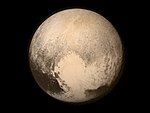(85989) 1999 JD6
 | |
| Discovery | |
|---|---|
| Discovered by | LONEOS |
| Discovery date | 12 May 1999 |
| Designations | |
| Orbital characteristics[1] | |
| Epoch 13 January 2016 (JD 2457400.5) | |
| Uncertainty parameter 0 | |
| Observation arc | 9167 days (25.10 yr) |
| Aphelion | 1.44183 AU (215.695 Gm) |
| Perihelion | 0.32425 AU (48.507 Gm) |
| 0.88304 AU (132.101 Gm) | |
| Eccentricity | 0.63280 |
| 0.83 yr (303.1 d) | |
| 137.83229° | |
| 1.18778°/day | |
| Inclination | 17.05701° |
| 130.21399° | |
| 309.18377° | |
| Earth MOID | 0.0487023 AU (7.28576 Gm) |
| Jupiter MOID | 3.86909 AU (578.808 Gm) |
| Physical characteristics | |
| Dimensions | ~0.7 km × 2 km (contact binary) |
| 7.6638 h (0.31933 d) | |
| ~0.15 | |
| K (SMASS) | |
| ~16–18 | |
| 17.1 | |
(85989) 1999 JD6 (provisional designation 1999 JD6) is an Aten asteroid, near-Earth object, and potentially hazardous object in the inner Solar System that makes frequent close approaches to Earth and Venus. On the Earth approach in 2015, it was observed by the Goldstone Solar System Radar and found to be a contact binary with the largest axis approximately 2 kilometers wide, and each lobe about 200–300 meters large.[2] Although 1999 JD6 in its current orbit never passes closer than 0.047 AU to Earth, it is listed as a potentially hazardous object because it is large and might pose a threat in the future.
The asteroid is well-observed, having been observed over 2,000 times over a length of over 25 years, and was assigned a numeric designation in August 2004.[3]
July 2015 Earth passage
[edit]
On 24 July 2015 1999 JD6 came as close as 19 lunar distances to Earth.[4] It was imaged by radar, and shown to be a contact binary, about 2 kilometers (1.2 miles) on its long axis.[4]
See also
[edit]References
[edit]- ^ "JPL Small-Body Database Browser: 1999 JD6". JPL. NASA. Retrieved 7 April 2016.
- ^ "JPL News: Earth Flyby of 'Space Peanut' Captured in New Video". JPL. NASA. Retrieved 1 August 2015.
- ^ "IAU Minor Planet Center: (85989) 1999 JD6". Minor Planet Center. IAU. Retrieved 1 August 2015.
- ^ a b PIA19647
External links
[edit]- PIA19647: Asteroid 1999 JD6 (Radar imaged 25 July 2015)
- Radar Movie of the same
- (85989) 1999 JD6 at NeoDyS-2, Near Earth Objects—Dynamic Site
- (85989) 1999 JD6 at ESA–space situational awareness
- (85989) 1999 JD6 at the JPL Small-Body Database



